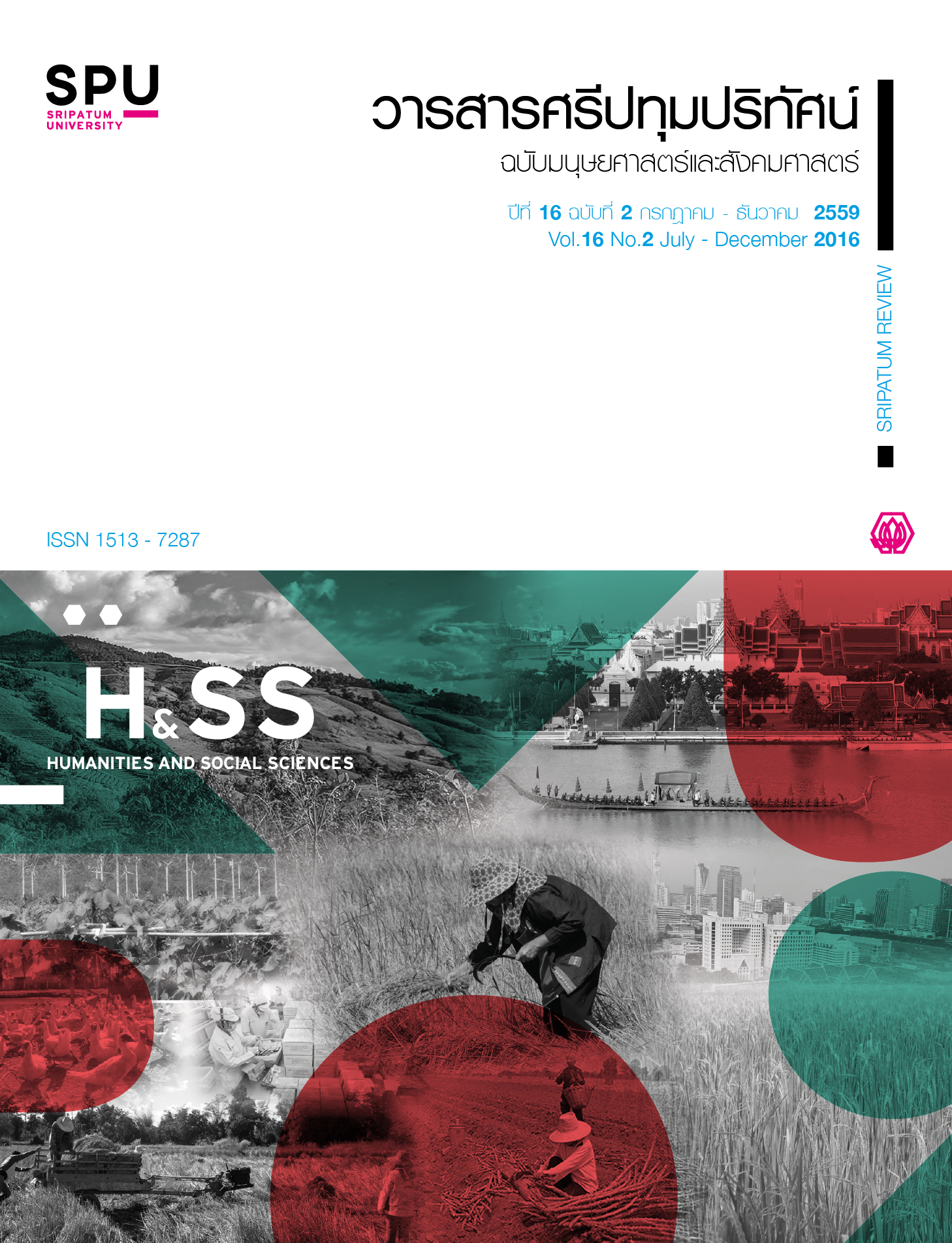A SYSTEMATIC EVALUATION OF BUDDHIST WAY SCHOOL PROJECT UNDER THE MINISTRY OF EDUCATION
Main Article Content
Abstract
The objective of this research was to conduct a systematic evaluation of the Buddhist Way School Project under the Ministry of Education during the 2014 – 2015 years. The evaluation was on five components of the Project, namely, the context, input, process, product, and impact. This research employed the mixed method approach involving the survey and multiple case studies. For the survey research, the research population comprised 22,201 Buddhist Way Schools throughout the country; while the research sample consisted of 635 Buddhist Way Schools obtained by stratified random sampling. The employed research instrument was a questionnaire. Its IOC indices for content validity, as assessed by five experts, ranged from 0.80 to 1.00. The Cronbach alpha reliability coefficients of the parts that were in the form of rating scale ranged from 0.97 to 0.98. The main questionnaire respondent from each school was the school administrator or the teacher in charge of the Project. Data were analyzed using the percentage, mean, and standard deviation. For the multiple case studies, three Buddhist Way Schools were purposively selected as the cases for study. Each of them represented a particular category of Buddhist Way School, namely, the Buddhist Way School in general, the leading Buddhist Way School, and the Buddhist Way School under the royal patronage. The employed research instruments were an interview structure, and a guideline form for focus group discussion. The key informants from each school consisted of the school director, five classroom teachers, and five students. Data were analyzed using the mode and content analysis. Research findings were as follows: (1) regarding the context of the Project, it was found that the purposes of the Buddhist Way School were rated at the highest level; (2) regarding the input of the Project, it was found that quality of the administrator, quality of the teachers, and quality of the administration system were rated at the high level; (3) regarding the process of the Project, it was found that the practice in compliance with the educational management approach based on the 29 identities of the Buddhist Way School was rated at the high level; (4) regarding the product of the Project, it was found that the physical, social, mental, and intellectual characteristics of Buddhist Way School students were rated at the high level; and (5) regarding the impact of the Project, it was found that the impacts of the operation of the Buddhist Way School on the home, Wat, and school were rated at the high level in all matters.
Article Details
1. กองบรรณาธิการสงวนสิทธิ์ในการพิจารณาและตัดสินการตีพิมพ์บทความในวารสาร
2. บทความทุกเรื่องจะได้รับการตรวจสอบทางวิชาการโดยผู้ทรงคุณวุฒิ แต่ข้อความและเนื้อหาในบทความที่ตีพิมพ์เป็นความรับผิดชอบของผู้เขียนแต่เพียงผู้เดียว มิใช่ความคิดเห็นและความรับผิดชอบของมหาวิทยาลัยศรีปทุม
3. การคัดลอกอ้างอิงต้องดำเนินการตามการปฏิบัติในหมู่นักวิชาการโดยทั่วไป และสอดคล้องกับกฎหมายที่เกี่ยวข้อง
References
กระทรวงศึกษาธิการ . 2547. โรงเรียนวิถีพุทธ. กรุงเทพฯ: โรงพิมพ์มหาวิทยาลัยมหาจุฬาลงกรณราชวิทยาลัย.
ชาตรี นามคุณ. 2552. “การพัฒนาแนวทางการดำเนินงานโรงเรียนแกนนำโรงเรียนวิถีพุทธเขตพื้นที่การศึกษาเชียงใหม่ เขต1.” วิทยานิพนธ์ปริญญามหาบัณฑิต สาขาบริหารการศึกษามหาวิทยาลัยเชียงใหม่.
ณัฏฐกิตติ์ ศรีสันต์. 2548. “ปัญหาและแนวทางการพัฒนาการดำเนินงานโรงเรียนวิถีพุทธในภาคตะวันออก.” วิทยานิพนธ์ปริญญามหาบัณฑิต สาขาบริหารการศึกษา มหาวิทยาลัยบูรพา.
บดินท์ ธรรมสังวาล. 2553. “การพัฒนาตัวบ่งชี้คุณภาพโรงเรียนวิถีพุทธ.” วิทยานิพนธ์ปริญญาดุษฎีบัณฑิต สาขาการวิจัยและพัฒนาหลักสูตร มหาวิทยาลัยศรีนคริน ทรวิโรฒ.
พระพิพิธสุตาทร และคณะ. 2549. การขยายผลการสร้างเครือข่ายโรงเรียนวิถีพุทธตามแนวสาระพระพุทธศาสนา. รายงานการวิจัยสถาบันวิจัยพุทธศาสตร์ มหาวิทยาลัยมหาจุฬาลงกรณราชวิทยาลัย.
ไพรัช สู่แสนสุข และบรรเจอดพร สู่แสนสุข. 2546. สู่เส้นทางโรงเรียนวิถีพุทธ. กระทรวงศึกษาธิการ.
รัตนะ บัวสนธ์. 2555. ทิศทางและอาณาบริเวณร่วมสมัยทางการวิจัยและประเมินผลการศึกษา (2555-2552) บทความทางวิชาการ: สืบค้นเมื่อวันที่
30 พฤศจิกายน 2558.
วิโรจน์ สารรัตนะ. 2554. การวิจัยทางการบริหารศึกษา: แนวคิดและกรณี ศึกษา. พิมพ์ครั้งที่ 2. กรุงเทพฯ:สำนักพิมพ์อักษราพิพัฒน์.
สุรศักดิ์ หลาบมาลา และรสสุคนธ์ มกรมณี. 2551. รูปแบบนวัตกรรมที่ส่งเสริมการเรียนรู้คุณธรรม จริยธรรมของต่างประเทศ. กรุงเทพฯ: ศูนย์ส่งเสริมและพัฒนาพลังแผ่นดินเชิงคุณธรรม. สำนักงานบริหารและพัฒนาองค์ความรู้(องค์การมหาชน).
Guttentag, M., and Struening, E.L. 1975. Handbook of Evaluation Research. Beverly Hills CA : Sage Publications.
Rossi, P.H. & Freeman, H.E. 1985. Evaluation: A Systematic Approach. 3rd ed. New Delhi: Sage Publications.
Stufflebeam, D.L., et al. 1971. Educational Evaluation and Decision Making. Itasca Illinois: Peacock Publishing.


